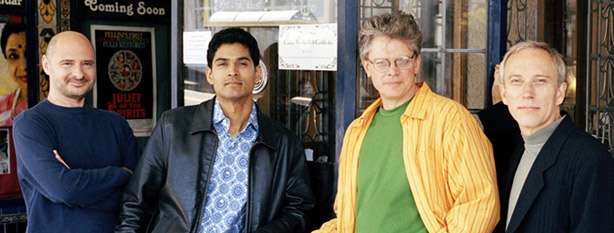|
Back
Chronicles of Time and Space New York
Zankel Hall, Carnegie Hall
02/28/2012 -
Donnacha Dennehy: One Hundred Goodbyes (Céad Slán) (World Premiere)
Vladimir Martynov: Schubert-Quintet (Unfinished) (New York Premiere)
Nicole Lizée: Death to Kosmische (New York Premiere)
Michael Hearst: Secret Word (World Premiere)
Kronos Quartet: David Harrington (Artistic Director/Violin), John Sherba (Violin), Hank Dutt (Viola), Jeffrey Zeigler (Cello), Joan Jeanrenaud (Cello) – Jacob Garchik (Sousaphone), Michael Hearst (Claviola, theremin, saxophone)
Laurence Neff (Lighting Designer), Scott Fraser (Sound Designer)

J. Sherba, J. Zeigler, D. Harrington, H. Dutt (© Jay Blakesberg)
Balloons, popping, whistles whistling, clappers clapping, 50-odd people on the Zankel stage whirring, yelling, singing, making a cacophonic noise to an oom-pah sousaphone and a weird accordion...
“So.”, asked a bemused visiting Martian, “This is a string quartet????”
Well, this is the Kronos String Quartet, the Godfather of ICE, Jack, Flux and all its other descendents who cross over, above and beyond technical expertise into quartet literature never dreamed of two decades ago.
In the balloon/whistle department, Kronos offered Michael Hearst’s homage to Pee-Wee Herman and Pee-Wee’s Playhouse a surrealistic television venture whose appeal transcended kids.
In the “old recording” department, the Kronos Quartet had two offerings. One was a symphonic descant to ancient Celtic songs, collected from the Irish countryside during the 1920s. They also had a work by a brilliant Montreal composer whose sounds could not be easily defined, but which went back several decades.
In fact, the only work which was pure “string quartet” had been written two centuries ago–and was then made into an homage by Vladimir Martynov. The work was Schubert’s original Quintet for strings, and they were joined here by Joan Jeanrenaud. once cellist with the Kronos, and a composer in her own right.
Martynov, whose styles go from Rock to religion to minimalist, apparently fell in love with the sounds of Schubert (who couldn’t ?), so enamored that, like a gourmet with a single perfect dish, savored each note. The themes were mainly from the original String Quintet , but phrases were repeated, paused, repeated again in varying keys, and, over about 25 minutes, performed with a mesmeric haunting feeling. It was labeled here “Unfinished”, and the notes which ended it left one breathless.
The opening was by the young Irish composer Donnacha Dennery, who had composed around old recordings of solo Irish singers. Initially, they are soft, the music has a jig-like movement, but gradually as the voices rise, the strings become even thicker, the sounds of two worlds in one.
Easily the most inventive work, and the least likely to explain was Nicole Lizée’s Death to Komische , and for this I needed an explanation. “Komische” was an avant-garde German rock trend of the 1970’s, using what was then crazy electronic instruments. They were all analogue, of course, and Ms. Lizée, splicing, looping and developing some of this music, against the Kronos, along with a few harp-like electronic instruments, offered a longish piece–almost 25 minutes–yet by the end, was of the more soothing music of the evening.
The Kronos always offers surprises, and here it was a film of the “Occupy” movement, ending with the police gassing a group of protestors who were sitting on the ground. The music was from a Philip Glass quartet, but the visuals were so gripping that the music was almost irrelevant.
Finally Michael Hearst. Violinist David Harrington and Hearst both share a love of Pee-Wee’s Playhouse , and the musical effects which made the inane visual so remarkable. The Kronos started with some Haydnesque chords, but a few minutes in, out marched Hearst with his accordion-thing, along with Jacob Garchik with a gaudily painted Sousaphone. Soon the Kronos was surrendering their instruments for electric gizmos–and then one-third of the audience marched onto the stage where two tables revealed a series of very vocal toys.
From then on, to the tones of the sousaphone and the accordion, everybody played, squawked, whistled and behaved as if they were in that fabled playhouse itself.
That bemused Martian I met was as confused when he departed as when he started, but his ears told the story. Ears on Mars register every sound, and his ears, after two hours of Kronos Quartet, were radiating not only every color of our world, but colors found only in outer space.
He, like us earthlings, was a very happy creature.
Harry Rolnick
|